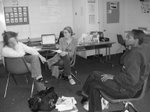1. Personal Mastery – Set of practices that support people in keeping their dreams whole while cultivating an awareness of the current reality around them.
Must draw forth a personal vision – What does it look like? Feel like? What are words to describe it?
In your ideal future, you are exactly the kind of person you want to be. What are your qualities?
What material things do you own? Describe your ideal living environment.
What have you achieve around health, fitness, athletics, and anything to do with your body?
What types of relationships do you have with friends, family, romatic partners, and others?
What is your ideal professional or vocational situation? If teaching, in what environment are you teaching; if not, what are you doing, and where?
If you are a teacher, what kind of teacher are you in your most desired future? How do your students see you? What impact do your efforts have?
What are you creating for yourself in the arena of individual learning, travel, reading, or other activities?
What kind of community or society do you live in?
What else, in any other arena of your life, represents the fulfillment of your most-desired results?
2. Mental Models – Assumptions of stories we have in our minds, bring underlying assumptions to mind about ourselves and others, to explore about differences.
MMs determine way we see everything.
Our ladder of inference – erode our ability to achieve the results we truly desire
Our beliefs are the truth.
The truth is obvious.
Our beliefs are based on real data.
The data we select are the real data.
Ways to counteract beliefs:
What are the observable data behind that statement?
Does everyone agree on what the data are?
Can you run me through your reasoning?
How did we get from that data to these abstract assumptions?
The Companion to the 4 Agreements
3. Shared Vision – example p. 175 Fostering Commitment to common purpose. Vision is not the "top" leader's job; it is all stakeholders' job. It will take time and commitment to open and link all types of communiation channels.
4. Team Learning – Transforming our skills of collective thinking The team players need to get together and know each other in a different environment, possibly in a different environment; a retreat, to improve communication skills. Dialogue, discussion, Why are we here? What is our purpose? What has brought us to education as a profession? What has kept us here? People learn how to think together – not just in the sense of analyzing a shared problem or creating new pieces of shared knowledge but in the sense of occupying a collective sensibility, in which the thoughts, emotions, and resulting actions belong not to one individual, but to all of them together.
Participants must be invited
Encourages people to “suspend” their assumptions
Encourages whole thinking vs. fragmentation
Open dialogue with a “check-in” at the beginning of every session and “check-out” at the end to give participants the opportunity to speak about what he/she is thinking, feeling, or has noticed. The atmosphere will be more relaxed.
Avoid agendas and elaborate preparations; these inhibit the free flow of conversation.
Meeting over a meal may break the ice, but can be distracting
Agree to hold 3 meetings before you decide to disband.
Speak to center of group, not each other.
Consider a trained facilitator. Dialogue is difficult to sustand, because it confronts people’s habitual ways of talking and thinking. It’s easy to get sidetracked into debate, argument, or manipulative consensus-building unless a skilled outsider is present to keep drawing the group back to its true purpose.
5. Systems Thinking – Developing awareness of complexity, interdependencies, change, and leverage
Types of Skills: Don't look at problems and goals as isolated events. Open your mind to the systems that play into the problems and goals. It is the study of school structure which is enriched by tools and techniques that are more effective. They may include: "system-wide thinking", "open systems thinking", "human systems thinking", "process systems thinking", "living systems thinking", "feedback-related systems thinking", "system dynamics simulation". Look at the event, patterns and trends, systemic structures (forces at play), and mental models.
Sunday, November 06, 2005
Subscribe to:
Comments (Atom)

